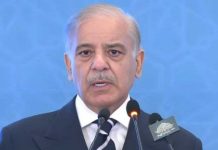ISLAMABAD, May 1 (DNA): The Islamabad High Court (IHC) is unlikely to schedule a hearing on Pakistan Tehreek-e-Insaf (PTI) founder Imran Khan’s appeal against his conviction in the £190 million case during the year 2025, the court’s registrar office has said.
According to a written report submitted to the IHC, the appeal — which challenges a 14-year jail sentence handed down in the case — was filed on January 31 2025.
The registrar’s office clarified that the case was still at the “motion stage” and would only proceed once paper books were prepared and it reaches its turn on the court’s roster.
The report outlines that, under directives from the National Judicial (Policy Making) Committee, a case fixation policy has been put in place to prioritise hearings based strictly on case order.
Consequently, Khan’s appeal cannot be prioritised over older pending cases. Currently, 279 appeals by convicted individuals are pending before the IHC.
These include 63 against the death penalty, 73 against life imprisonment, 88 involving sentences over seven years, and 55 for sentences under seven years. The oldest pending death penalty appeal dates back to 2017.
The registrar’s report reaffirms that, in line with judicial policy, all appeals are scheduled based on their sequence, and there is no prospect of early listing for Khan’s appeal in the current year.
What is Al-Qadir Trust case?
The Al-Qadir Trust case, commonly known as the £190m case involved allegations that Khan and some others in 2019 adjusted Rs50 billion — amounting to £190 million at the time — sent by Britain’s National Crime Agency (NCA) to the Pakistani government during his tenure as the country’s prime minister.
The concerned amount relates to a property tycoon’s assets which were seized by the NCA during PTI’s rule. The British crime agency back then had said that the amount was supposed to be passed to the Government of Pakistan as its settlement with the Pakistani property tycoon was “a civil matter, and does not represent a finding of guilt”.
However, the NAB filed a reference in December 2023, followed by charges against Khan and his wife, Bushra Bibi, on February 27, 2024, alleging that a settlement with the British crime agency was reached and approved by then-prime minister Khan on December 3, 2019, without disclosing details of the confidential agreement.
Although it was decided that the money would be submitted to the Supreme Court on behalf of the businessman concerned, Al-Qadir Trust was set up a few weeks later following an agreement — allegedly aimed at providing legal cover to the black money received from the NCA — with the property mogul.
PTI leaders Zulfi Bukhari, Babar Awan, the then-first lady Bushra, and her close friend Farhat Shehzadi alias Farah Gogi were appointed as members of the trust.
The anti-graft watchdog further accuses Bukhari, a close aide of the PTI founder, of receiving 458 kanals of land a few months after the cabinet’s approval of the settlement.
The land was later transferred to the trust which is now registered in the name of Khan, Bushra and Farah after Bukhari and Awan opted out.
After authorities began probing the matter, Khan was arrested from the Islamabad High Court (IHC) on May 9, 2023.
This was the first time the ousted prime minister was arrested, followed by countrywide violent protests by the PTI supporters during which his supporters attacked and set fire to military and other state installations.
However, Khan was granted bail on IHC’s orders after a few days, while the Supreme Court deemed also his arrest from the premises of the high court “illegal”.
The trial, which spanned over a year, saw key witnesses testify, including former cabinet members Pervez Khattak and Zubaida Jalal, ex-principal secretary Azam Khan, and the chief financial officer of the Al-Qadir University.
Pervez Khattak testified that then-accountability adviser Mirza Shahzad Akbar presented a sealed document to the cabinet, describing it as an agreement between the Pakistani government and the NCA for the refund of crime proceeds.
Azam corroborated that Akbar had brought a sealed document for approval.
Zubaida Jalal stated that cabinet members were not informed about the transfer of “proceeds of crime” to the property tycoon.
During the trial, six co-accused, including Zulfi Bukhari, Farah Gogi, Mirza Shahzad Akbar, and Zia-ul-Mustafa Nasim, were declared absconders. The court ordered the freezing of their assets and bank accounts.
Khan submitted a list of 16 witnesses to the trial court, but the request to summon them was denied. Meanwhile, the case proceedings saw multiple judicial changes, with four judges — Judge Muhammad Bashir, Judge Nasir Javed Rana, Judge Muhammad Ali Warraich, and Judge Rana again — presiding over the hearings.
The couple was eventually convicted in January 17, 2025 with Accountability Court Judge Nasir Javed Rana handing down a 14-year sentence to Khan and a seven-year sentence to his wife.
The court also imposed a fine of Rs1 million on the former prime minister, whereas Bushra was awarded a a fine of Rs0.5 million. In case they fail to pay the fine, the ex-prime minister will serve six months more and Bushra three months.

















